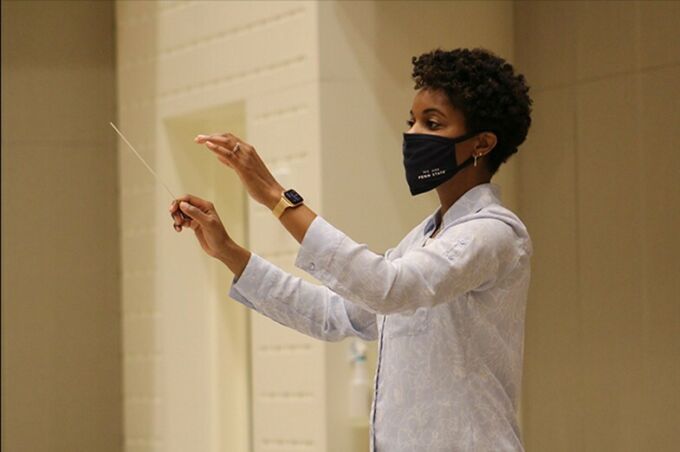October 13, 2020
School of Music leans on science to find harmony during pandemic

As the spring 2020 semester was winding down in unprecedented fashion, School of Music administration pivoted to the 2020-2021 academic year. But as the science around virus spread within the performing arts became clearer, the task of providing a safe atmosphere for students to learn proved to be daunting.
A School of Music COVID Committee, comprising administration, faculty and staff, was quickly formed and from its initial meeting, the decision-making process was steered by scientific, peer-reviewed research, said Russell Bloom, assistant director of operations and outreach.
“The information was evolving weekly, it seemed, and we were presented with terminology that was not part of any music vocabulary,” Bloom said. “I truly never thought I would use the words ‘bioaerosol emissions’ in the performing arts.”
As the committee became familiar with bioaerosol emissions, or small airborne particles suspended in air that are produced by living organisms, traditional educational models for singers or wind instrumentalists quickly became the focus as pedagogy in the performing arts presented the possibility of creating “super spreader” events.
While the group was meeting extensively to discuss the wave of research findings around bioaerosol emissions in the performing arts, the college’s facilities were front and center.
To help understand the science and to formulate a plan for students to return to campus, the group enlisted the help of William Bahnfleth, professor of architectural engineering in the College of Engineering, who is an international heating, ventilation and air conditioning specialist with a focus in indoor air quality and protection of building occupants from bioaerosol releases.
Bahnfleth’s expertise helped the school to develop its “30 in and 30 out” policy, which requires every in-person class held indoors to be only 30 minutes long. Students and faculty must vacate the room for 30 minutes while the HVAC system recirculates new air into the room.
In addition to the facilities policies developed, singers have been given a special mask to wear that is slightly off the face with a foam seal. All brass players have a special mask with a slit for a mouthpiece and all wind instruments have a covering on their bell. Flute, oboe and bassoon students have a mask that is designed with a flap that doesn't affect the double reeds or the embouchure of the flute.
Courses are being delivered through a mix of in-person and online instruction. In-person classes are capped at 16 students and distance minimums are eight feet for some instruments and up to 12 feet for singers.
Olivia Blackmore, a senior majoring in music education and president of the Penn State Concert Choir, said the logistical adjustments have been challenging, but she feels that quality of education remains at a high level.
“There has been so much research and creative collaboration to find new ways to overcome these challenges,” Blackmore said. “We are very lucky to have the School of Music faculty and staff and there is so much work happening behind the scenes to help things run smoothly in these unprecedented times.”
For students like Blackmore, performances and recitals are the highlight of the semester and although the school is hosting no in-person events, the shows have gone on.
“We are finding ways to make it work,” School of Music Director David Frego said. “Faculty and students are maintaining our presence by live-streaming performances to local and global audiences, and they are looking for outdoor performance opportunities. It has made everyone more entrepreneurial and I feel that this spirit will continue beyond these COVID days.”
While the policies the School of Music COVID Committee developed will remain in place during the spring 2021 semester, Bloom said the work will not stop until it is clear that the threat of the virus is mitigated.
“I would say the word to describe the School of Music in time of pandemic is ‘improvisatory,’” Bloom said. “We are taking extraordinary precautions, and considering that information about the virus evolves regularly, science will continue to be the basis for all of our decisions.”
